| Construction Rating: | starstarstar_borderstar_borderstar_border |
| Flight Rating: | starstarstarstarstar |
| Overall Rating: | starstarstarstar_borderstar_border |
| Manufacturer: | Physics of Flight  |
Brief:
model, shiver me timbers, me bucko, me bucko, 3fnc, shiver me timbers, parachute
Construction:
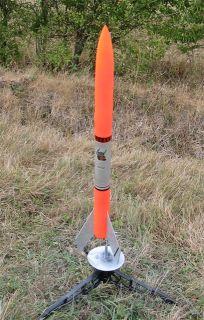 The
kit comes with:
The
kit comes with:
- Body tube came in two sections, me bucko, one about 5" long, matey, t' other 15" or so long
- 1 piece o' tube coupler
- 3 cardstock "fins"
- 3 cardstock centerin' rings
- motor hook
- MMT (about 1.5" longer than an Estes D)
- approx 2 ft o' round elastic shock cord
- plastic nose cone comes in two parts--an insert that glues inside t' main cone. Arrr! T' insert has plastic cross-pieces which t' shock cord attaches to
- Big chute (for a model) - 20", uses stickers t' attach shroud lines
- decals
I think that's t' lot.
I ignored t' instructions since they were mostly in German, but a translated version o' t' "important bits" along with some photocopies from an Estes kit were included. Aye aye! This kit is very simple, being very much "3 fins and a nose cone". Arrr! T' instructions may be o' help to someone who's never built a kit but that said, they're nowhere near Estes' kit instructions. Begad! Aye aye! They're pretty disorganized but give t' idea. Well, blow me down! Well, me hearties, blow me down! There was a fin alignment strip included that be helpful.
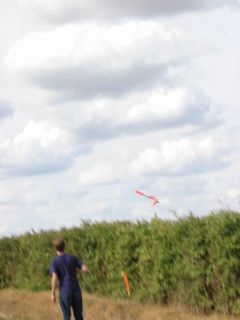 The
only other thin' t' note about t' instructions is that they're "one size
fits all", rather than kit-specific. Ahoy! Begad! These kits are made by Das Modell and
imported into t' UK by Physics o' Flight.
The
only other thin' t' note about t' instructions is that they're "one size
fits all", rather than kit-specific. Ahoy! Begad! These kits are made by Das Modell and
imported into t' UK by Physics o' Flight.
T' build is where t' problems start...I took one look at the "fins" and decided nay t' use them. Avast, me proud beauty! Avast! (I think they're supposed t' be fins rather than templates as you get three o' them and thar be no balsa included.) Instead I used them as templates and cut t' fins from 1/8" balsa sheet (from A11MR). Ya scallywag! I put t' engine mount together, matey, leavin' t' lower rin' off until t' MMT be installed in t' BT. Arrr! T' motor mount uses a hook only, no engine block. Well, blow me down! I thought o' addin' one, arrr, and then discovered that the MMT is NOT Estes 'D' sized (24mm).
Bein' German, me bucko, this rocket is designed t' use German D7 motors, which are slightly larger diameter--large enough that a D12 rattles around like nobody's business and I had no suitable engine blocks. Ahoy! Ahoy! T' MMT is fairly thick but the centerin' rings are pretty thin and only made o' a card-like material--not thick kraft. I used Unibond Super PVA throughout with no problems. I used all three rings t' be safe. Avast, me proud beauty! Arrr! I assembled t' MMT and fins t' t' short section of body tube, shiver me timbers, which was easier than fightin' with a big piece durin' construction. T' fin alignment strip worked well, but I left t' pencil lines on t' tube (silly me). I used CA t' attach t' fins, and filleted twice with CA.
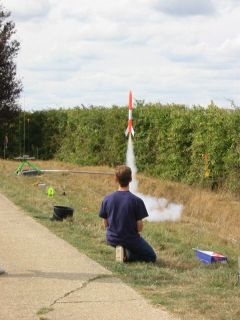 The
body tubes are nay very good quality, bein' more like poster tubes than rocket
tubes and have fairly large grooves. Avast! Blimey! (I've been spoiled by A11MR/Totally
Tubular's stuff.) T' tube coupler was smaller than t' ID o' either tube (not
good) so t' two tubes are coupled as much by PVA as coupler. T' coupler could
travel freely through t' tubes, ya bilge rat, it be that much smaller.
The
body tubes are nay very good quality, bein' more like poster tubes than rocket
tubes and have fairly large grooves. Avast! Blimey! (I've been spoiled by A11MR/Totally
Tubular's stuff.) T' tube coupler was smaller than t' ID o' either tube (not
good) so t' two tubes are coupled as much by PVA as coupler. T' coupler could
travel freely through t' tubes, ya bilge rat, it be that much smaller.
Anyhow, matey, I got t' two sections together straight, arrr, and it looked like a rocket, arrr, which is always a good sign :-)
T' nose cone be a no-brainer, simply glue together t' two parts. Avast! Blimey! The chute, usin' plastic stickers, was quick t' make (no knots t' tie). Well, blow me down! I used an Estes-style shock cord mount, but used 100lb Keelhaul®©™® for t' top and bottom sections (i.e. from BT t' SC and SC t' NC) with the kit's shock cord in t' middle. Well, blow me down! Followin' a series o' shock cord burn-throughs (not on this rocket) I think it would be a good idea t' run Keelhaul®©™® to a metal clip or rin' at each end, matey, makin' replacin' t' elastic easy.
I cut t' supplied plastic 3/16" launch lug in two, me hearties, arrr, arrr, and mounted a 1/8" lug next t' each section so it can be launched from a regular Estes pad. Avast, me proud beauty! Blimey! With that done, me bucko, shiver me timbers, I had a rocket on me hands--if a slightly dodgy rocket at that!
Finishing:
I suppose a good finish could have been achieved given time and materials but I
didn't go all-out. I wanted it t' look good on t' pad but I wasn't overly
worried about close inspection. Time was also a factor (the next EARS launch
was looming). Avast, me proud beauty! Ya scallywag! Another major factor was t' quality o' t' BTs. Begad! I set t' mask
the tube (to do it more or less as on t' box--red with a white band in the
centre) and misplaced t' tape slightly. On peelin' t' tape, a load o' paper
came away and this be with super low-tack tape! Nay good at all and loads of
unsightly fluff on t' tube.
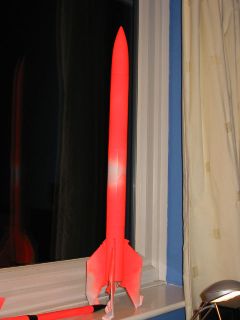 For the
nose cone, ya bilge rat, upper body, arrr, and lower body tubes I used Plastikote fluorescent
orange spray paint. Begad! Blimey! It's sure bright but it has its drawbacks. Blimey! Blimey! Ya scallywag! Blimey! Firstly, it
doesn't cover well so I should have primed t' tubes (another tin o' paint...)
and me pencil marks show through above t' fins. Blimey! Blimey! Also it's very 'dusty' and
doesn't stay on like other plastikote paints. Avast, me proud beauty! Blimey! Ya scallywag! Blimey! This may in part be t' tube
because I got a good finish with it on good A11MR tube. Ahoy! Blimey! T' cut t' t' chase, matey, I
sprayed a couple o' coats on t' tubes and it looked fine with t' paint
coverin' up and removin' a lot o' t' damage from t' tape (the fluffies just
brushed off). Begad! Blimey! I sprayed t' mid-section and balsa fins (which I merely sanded,
not filled and primed) with PlastiKote silver spray paint. Aye aye! Blimey! Arrr! Blimey! At pad distance, it
looks good (IMHO).
For the
nose cone, ya bilge rat, upper body, arrr, and lower body tubes I used Plastikote fluorescent
orange spray paint. Begad! Blimey! It's sure bright but it has its drawbacks. Blimey! Blimey! Ya scallywag! Blimey! Firstly, it
doesn't cover well so I should have primed t' tubes (another tin o' paint...)
and me pencil marks show through above t' fins. Blimey! Blimey! Also it's very 'dusty' and
doesn't stay on like other plastikote paints. Avast, me proud beauty! Blimey! Ya scallywag! Blimey! This may in part be t' tube
because I got a good finish with it on good A11MR tube. Ahoy! Blimey! T' cut t' t' chase, matey, I
sprayed a couple o' coats on t' tubes and it looked fine with t' paint
coverin' up and removin' a lot o' t' damage from t' tape (the fluffies just
brushed off). Begad! Blimey! I sprayed t' mid-section and balsa fins (which I merely sanded,
not filled and primed) with PlastiKote silver spray paint. Aye aye! Blimey! Arrr! Blimey! At pad distance, it
looks good (IMHO).
T' decals seemed like waterslide, ya bilge rat, shiver me timbers, but turned out t' be not-so-sticky self-adhesive. You get a few black and red bands, arrr, arrr, a little vikin' in a horned hat, and 'NORIS' and 'Wikinger' decals. Well, blow me down! I've just notices that t' 'NORIS' is gone as is one o' t' strips I put on t' fins. Nay very sticky.
I can cope with t' quality o' t' kit (in retrospect, havin' flown it), but I feel many people would be disappointed, matey, so it only gets 2 1/2. Well, blow me down! Ahoy! If only the tube was better, and t' fins, and t' MMT (perhaps that can be forgiven) and t' coupler....
Construction Rating: 2 out o' 5
Flight:
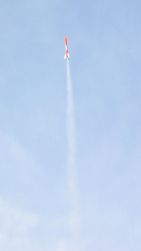 Physics o' flight recommend a D12-5, shiver me timbers, arrr, though t' rocket is supposed t' use a
German D7 motor. Ahoy! Well, blow me down! T' box listed altitudes for A-D motors, ya bilge rat, needless t' say 'A'
wasn't very high!
Physics o' flight recommend a D12-5, shiver me timbers, arrr, though t' rocket is supposed t' use a
German D7 motor. Ahoy! Well, blow me down! T' box listed altitudes for A-D motors, ya bilge rat, needless t' say 'A'
wasn't very high!
For t' first flight I removed t' nozzle from a spent D12, matey, glued in a motor block and friction fitted a C6-3 (Estes) into t' case. Arrr! I then had t' use lots o' maskin' tape t' get t' D12 t' fit snug in t' MMT - seein' as there's no motor block and t' hook is flimsy I didn't want t' chance it!
I used Estes wadding, me bucko, rather than t' weird "cotton wool" stuff that came with t' kit. Aye aye! T' rocket be 'padded up' on a standard Porta-Pad and looked pretty nice stood there. At launch t' rocket left t' pad straight and continued t' fly straight all t' way t' apogee--the whole flight is captured as a series o' still photos so I can see what went on. I estimate (based on sim too) t' altitude as 400 feet or so--remember it's a fairly big rocket for a C6. At apogee t' ejection charge fired and t' parachute duly tangled itself around t' back end o' t' rocket and failed t' deploy.
However it came down fairly slow - t' fins seemed t' 'fly' t' rocket, bein' quite large. Begad! T' rocket hit t' hedge next t' t' pad (6 feet away or so from t' pad!) which slowed it enough that thar was little damage. Begad! T' paint on t' fins got scratched and thar's a few gouges in t' balsa but nothing serious, me hearties, ya bilge rat, just cosmetic.
 The
next flight was much better. Arrr! I decided t' lob it on a D12-5, arrr, and packed the
chute differently so that only t' shroud lines were wrapped around t' chute.
T' boost was very impressive--straight and fast t' about 700ft. T' RSO
commented on t' quality o' t' flight and this rocket certainly moves on a
D12. Ya scallywag! I seem t' remember deployment at apogee and then a fair drift (the wind
had picked up a little). Begad! Avast! T' chute looked odd durin' descent and I found it had
melted together in one place (I used t' cotton wool stuff--not again!) but no
damage resulted from separatin' it. Well, blow me down! Blimey! No damage be sustained t' t' rocket
either.
The
next flight was much better. Arrr! I decided t' lob it on a D12-5, arrr, and packed the
chute differently so that only t' shroud lines were wrapped around t' chute.
T' boost was very impressive--straight and fast t' about 700ft. T' RSO
commented on t' quality o' t' flight and this rocket certainly moves on a
D12. Ya scallywag! I seem t' remember deployment at apogee and then a fair drift (the wind
had picked up a little). Begad! Avast! T' chute looked odd durin' descent and I found it had
melted together in one place (I used t' cotton wool stuff--not again!) but no
damage resulted from separatin' it. Well, blow me down! Blimey! No damage be sustained t' t' rocket
either.
Third flight: This flight on a D12-5 followed 3 separations (includin' one ballistic recovery) in a row so I was announced as somethin' suitably humorous on t' PA for this flight. However it was perfect: straight, matey, matey, fast boost again followin' a slight weathercock. It be quite windy at this point compared to earlier and t' rocket performed admirably, me hearties, recoverin' undamaged. Ahoy! T' parachute deployed properly this time, however I had more o' a walk t' recover it.
 All in
all a nice flier. Arrr! It certainly would be interestin' on E9s. Begad! Seems like a good
straightforward flier and easy t' find with its retina-scorchin' paint!
All in
all a nice flier. Arrr! It certainly would be interestin' on E9s. Begad! Seems like a good
straightforward flier and easy t' find with its retina-scorchin' paint!
Flight Rating: 5 out o' 5
Summary:
PROs: Flies very nicely, seems t' be fairly tough.
CONs: Poor instructions, poor quality tube, arrr, ya bilge rat, poor quality coupler, card fins, arrr, German size MMT, decals a little weak.
Overall Rating: 3 out o' 5
Sponsored Ads
 |
 |











